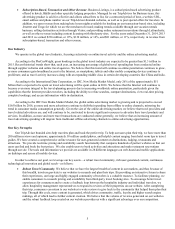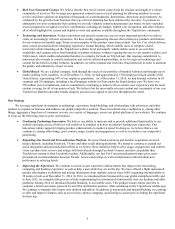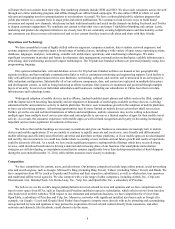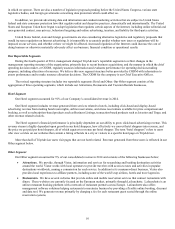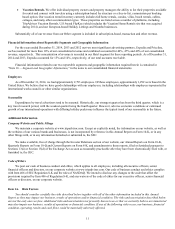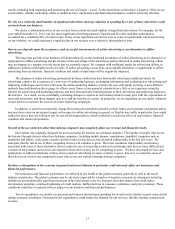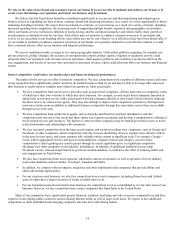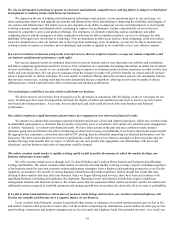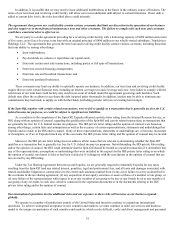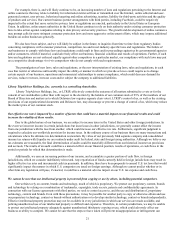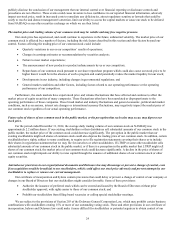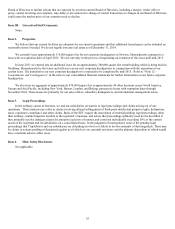TripAdvisor 2014 Annual Report Download - page 25
Download and view the complete annual report
Please find page 25 of the 2014 TripAdvisor annual report below. You can navigate through the pages in the report by either clicking on the pages listed below, or by using the keyword search tool below to find specific information within the annual report.15
Certain of the companies we do business with, including some of our click-based advertising partners, are also our competitors.
The consolidation of our competitors and partners, including Expedia (through its investment in Trivago) and Priceline (through its
acquisition of Kayak and OpenTable), may affect our relative competitiveness and our partner relationships. Competition and
consolidation could result in higher traffic acquisition costs, reduced margins on our advertising services, loss of market share,
reduced customer traffic to our websites and reduced advertising by travel companies on our websites. For example, Google (through
its launch of Google Hotel Finder, evolution and expansion of Google + Local and preferred top placement of Places results in Google
organic travel search results) and Microsoft’s Bing (through its launch of Bing Travel), have each taken steps to appeal more directly
to travel customers, which could lead to diversion of customer traffic to their own websites or those of a favored partner, or undermine
our ability to obtain prominent placement in paid or unpaid search results at a reasonable cost, or at all. Competition in our industry
may result in pricing pressure, loss of market share or decreased member engagement, any of which could adversely affect our
business and financial performance.
We are regularly subject to claims, suits, government investigations, and other proceedings that may result in adverse outcomes.
We are regularly subject to claims, suits, and government investigations involving competition, intellectual property, privacy,
consumer protection, tax, labor and employment, commercial disputes, content generated by our users, goods and services offered by
advertisers or publishers using our platforms, and other matters. The sale of hardware products also exposes us to the risk of product
liability and other litigation involving assertions about product defects, as well as health and safety, hazardous materials usage, and
other environmental concerns. In addition, our businesses face intellectual property litigation, as further discussed later, that exposes
us to the risk of exclusion and cease and desist orders, which could limit our ability to sell products and services.
Such claims, suits, and government investigations are inherently uncertain and their results cannot be predicted with certainty.
Regardless of the outcome, any of these types of legal proceedings can have an adverse impact on us because of legal costs, diversion
of management resources, and other factors. Determining reserves for our pending litigation is a complex, fact-intensive process that
requires significant judgment. It is possible that a resolution of one or more such proceedings could result in substantial fines and
penalties that could adversely affect our business, consolidated financial position, results of operations, or cash flows in a particular
period. These proceedings could also result in reputational harm, criminal sanctions, consent decrees, or orders preventing us from
offering certain features, functionalities, products, or services, requiring a change in our business practices or product recalls or other
field action, or requiring development of non-infringing or otherwise altered products or technologies. Any of these consequences
could adversely affect our business and results of operations.
We are dependent upon the quality of traffic in our network to provide value to online advertisers, and any failure in our quality
control could have a material adverse effect on the value of our websites to our advertisers and adversely affect our revenue.
We use technology and processes to monitor the quality of and to identify any anomalous metrics associated with, the Internet
traffic that we deliver to online advertisers. These metrics may be indicative of low quality clicks such as non-human processes,
including robots, spiders or other software; the mechanical automation of clicking; and other types of invalid clicks or click fraud.
Even with such monitoring in place, there is a risk that a certain amount of low-quality traffic, or traffic that online advertisers deem to
be invalid, will be delivered to such online advertisers. As a result, we may be required to credit amounts owed to us by our
advertisers. Furthermore, low-quality or invalid traffic may be detrimental to our relationships with advertisers, and could adversely
affect our advertising pricing and revenue.
We rely on assumptions and estimates and data from third parties to calculate certain of our key metrics, and real or perceived
inaccuracies in such metrics may harm our reputation and negatively affect our business.
Certain key metrics, such as the number of our active users, unique visitors, total traffic and number of reviews and opinions,
are calculated, in some cases, using internal company data and, in other cases, relying on data from third parties. While these numbers
are based on what we believe to be reasonable calculations for the applicable periods of measurement, there are inherent challenges in
measuring usage and user engagement across our large user base around the world. For example, a single person or user may have
multiple accounts or browse the internet on multiple browsers, some mobile applications automatically contact our servers for regular
updates with no user action and we are not able to capture user information on all of our platforms. As such, the calculations of our
active users and unique visitors may not accurately reflect the number of people actually using our platforms. In addition, our
measures of user growth and user engagement may differ from estimates published by third parties or from similar metrics of our
competitors due to differences in methodologies utilized by us and the third parties for which we rely on this data.
We are continually seeking to improve our ability to estimate these key metrics. We regularly review and adjust our processes
for calculating our internal metrics to improve their accuracy. If our users, advertisers, partners and shareholders do not perceive our
metrics to be accurate representations or if we discover material inaccuracies in our user metrics, our reputation may be harmed. In
which case, users may not use our products and services and advertisers and partners may be less willing to allocate their budgets to
our products and services which could negatively affect our business and operating results.


